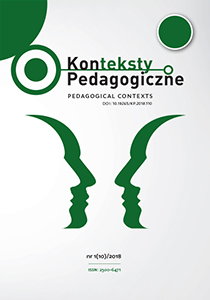Abstrakt
Nauczyciele w toku swojej pracy budują osobiste koncepcje eduka-cyjne dotyczące myślenia i uczenia się dzieci. Z nich wynikają realizowane sposo-by prowadzenia procesu nauczania-uczenia się. Przesłankami do budowy własne-go ujmowania procesu są: wiedza teoretyczna nabywana w trakcie przygotowania do zawodu, doświadczenie zawodowe gromadzone w pracy z różnymi grupami w odmiennych środowiskach społeczno-kulturalnych oraz aktualne oczekiwania społeczne. Zróżnicowanie możliwości uczniowskich obliguje nauczycieli do do-boru form pomocy uczniom w jakiejś mierze odbiegających od głównej grupy rówieśniczej. W artykule zestawiono modele uczenia się dzieci według pedagogii potocznych (J. Brunera) z przekonaniami polskich nauczycieli.
Bibliografia
Adamek, I. (2014). Jakość edukacji dziecka/ucznia – nauczyciele jako przewodnicy w uczeniu się. W: I. Adamek i B. Olszewska (red.), Pomiędzy dwiema edukacjami. Nauczyciele wczesnej edukacji dziecka wobec czasu zmiany (s. 15–25). Łódź: Wydaw-nictwo Naukowe WSP.
Bruner, J. (2006). Kultura edukacji, przeł. T. Brzostowska-Tereszkiewicz. Kraków: Universitas.
Ferenz, K. (2003). Konteksty edukacji kulturalnej. Społeczne interesy i indywidualne wy-bory. Zielona Góra: Uniwersytet Zielonogórski.
Fromm, E. (2005). Niech się stanie człowiek. Z psychologii etyki, przeł. R. Saciuk. War-szawa: PWN.
Gordon, T. (1995). Wychowanie bez porażek w szkole, przeł. A. Makowska, E. Sujak. Warszawa: Instytut Wydawniczy PAX.
Jarosz, E. (2007). Wybrane obszary diagnozowania pedagogicznego. Seria Pedagogika. Katowice: Wydawnictwo Uniwersytetu Śląskiego.
Kochanowska, E. (2015). Pozaszkolne doświadczenia i wiedza potoczna dziecka jako przestrzeń szkolnych działań edukacyjnych. W: E. Jezierska-Wiejak i J. Malinow-ska (red.), Dziecko w sytuacjach uczenia się. Konteksty i przestrzenie edukacyjne(s. 95–109). Wrocław: ATUT.
Kozielecki, J. (1998). Koncepcje psychologiczne człowieka. Warszawa: PIW.
Mihilewicz, S. (2002). Znaczenie nauczania zintegrowanego dla rozwoju dziecka i efek-tywności edukacji. W: M. Prokosz (red.), Nauki Pedagogiczne we współczesnej huma-nistyce (s. 72–80). Toruń: Adam Marszałek. Muchacka, B. (2000). Stymulowanie aktywności poznawczej w przedszkolu. Kraków: Wydawnictwo Naukowe Akademii Pedagogicznej.
Orstein, A.C. i Hunkins, F.P. (1999). Program szkolny. Założenia, zasady, problematyka, przeł. K. Kruszewski. Warszawa: WSiP.
Skibska, J. (2015). Umiejętności dzieci 6-letnich rozpoczynających edukację w I klasie. W: E. Jezierska-Wiejak i J. Malinowska (red.), Dziecko w sytuacjach uczenia się. Kon-teksty i przestrzenie edukacyjne (s. 171–186). Wrocław: ATUT.
Włodarczyk, R. (2016). Ideologia, teoria, edukacja. Myśl Ericha Fromma jako inspiracja dla pedagogiki współczesnej. Kraków: Impuls.
Zajdel, K. (2016). Znaczenie oceniania w przebiegu życia. Zielona Góra: Wydawnictwo Uniwersytetu Zielonogórskiego.
Autor zgodnie z zaleceniem MNiSW, by przeciwdziałać praktykom „ghostwriting” i „guest authorship” składając tekst dołącza oświadczenie Autora/Autorów, w którym deklaruje wkład każdego z Autorów w powstawanie publikacji. Własnoręcznie podpisane oświadczenie należy przesłać na adres redakcji:
Joanna Skibska | w formie skanu przesłać poprzez system OJS (biblioteka wydawcy).
Autorzy nie ponoszą żadnych kosztów w związku z publikacją artykułu na łamach czasopisma Konteksty Pedagogiczne oraz nie otrzymują gratyfikacji finansowej za opublikowanie tekstu. Redakcja zastrzega sobie prawo do wprowadzania niewielkich zmian w artykułach, które nie mają wpływu na merytoryczną stronę publikacji.
Autor (Autorzy) artykułu oświadcza, że przesłane opracowanie nie narusza praw autorskich osób trzecich. Wyraża zgodę na poddanie artykułu procedurze recenzji oraz dokonanie zmian redakcyjnych. Przenosi nieodpłatnie na Wydawnictwo Libron autorskie prawa majątkowe do utworu na polach eksploatacji wymienionych w art. 50 Ustawy z dnia 4 lutego 1994 r. o prawie autorskim i prawach pokrewnych – pod warunkiem, że praca została zaakceptowana do publikacji i opublikowana.
Wydawnictwo Libron posiada autorskie prawa majątkowe do wszystkich treści czasopisma. Zamieszczenie tekstu artykuły w repozytorium, na stronie domowej autora lub na innej stronie jest dozwolone o ile nie wiąże się z pozyskiwaniem korzyści majątkowych, a tekst wyposażony będzie w informacje źródłowe (w tym również tytuł, rok, numer i adres internetowy czasopisma).
Tekst jest udostępniany w internecie na licencji CC-BY-SA

